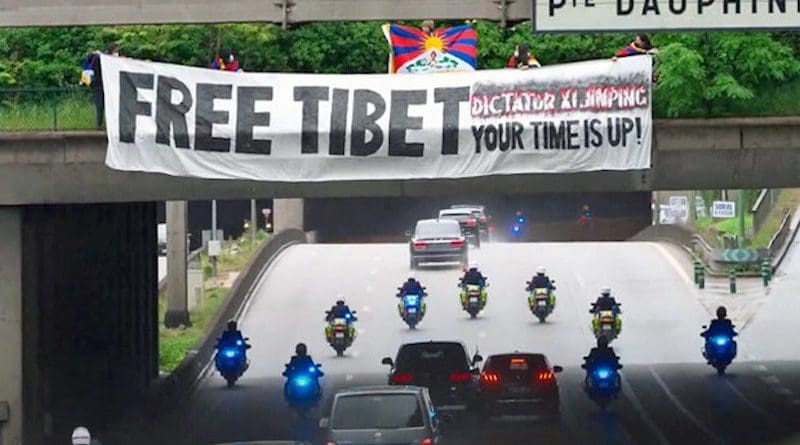Tibetan, Uyghur Protesters Greet Xi Jinping In Paris
By RFA
By Roseanne Gerin
Unfurling banners and waving flags, Uyghur, Tibetan and Chinese activists took to the streets to protest Chinese President Xi Jinping’s two-day visit to Paris.
“Free Tibet. Dictator Xi Jingping, your time is up!” declared a large white banner that his motorcade had to drive under on the Boulevard Périphérique after his arrival on Sunday, on his way for a state visit with French President Emmanuel Macron.
Atop the banner was the flag of Tibet — a symbol of the Tibetan independence movement that has become known as the “Free Tibet flag.”
The visit was Xi’s first European tour since 2019 and marked the 60th anniversary of the establishment of Franco-Chinese diplomatic relations.
Ethnic Tibetan from France, Belgium, Hungary and elsewhere gathered to express their anger over Beijing’s restrictions on religious and cultural expression in Tibet — which China invaded in 1950 and now controls — and human rights violations.
Uyghurs also rallied in Paris, seeking to draw attention to the abuses their families and friends have suffered in the far-western region of Xinjiang, including mass arbitrary detentions in prisons. The United States and some Western parliaments have identified China’s persecution of the Uyghurs as a genocide and crimes against humanity.
The protesters were joined by Chinese, Taiwanese, Mongolian and Vietnamese human rights activists as well as Hong Kong pro-democracy supporters.
“Under Xi Jinping’s rule, the situation in Tibet has gone from bad to worse,” Tenzin Yangzom, campaigns coordinator at International Tibet Network, said in a statement.
“Today, we confronted Xi with our message that his time is up and Tibet will be free as he was forced to drive under our banner and Tibetan flags,” she said. “President Macron and European leaders should not be rolling out the red carpet for a man guilty of genocide.”
More than 1,000 demonstrators gathered in the city’s Place de la République on May 5, displaying Tibetan flags and placards in French, calling for an end to repression inside Tibet, the release of Tibetan prisoners and a stop to China’s construction of dams in the region.
As street performers depicted the dismal human rights situation inside Tibet, they then marched to the Place de la Bastille, where they remained for over four hours.
Within Xi’s sight, Tibetan activists waved Tibetan national flags — an action banned in Tibet by the Chinese government and punishable by arrest, Students for a Free Tibet said in a statement.
French politicians
Even French politicians got into the act, calling on Macron to raise the Tibet issue with Xi in a letter signed by 14 senators on May 2.
“The resumption of Sino-Tibetan dialogue and respect for the rights of the Tibetan people must be at the heart of the French strategy vis-à-vis China,” the letter said, in a reference to the Chinese government’s cutoff of talks in 2010 between Beijing and the Dalai Lama on genuine autonomy for Tibetans.
Uyghurs gathered at Madeleine Square, close to the French president’s residence, to show their opposition to Xi, said Dilnur Ryhan, president of the European Uyghur Institute.
Some pro-China activists holding Chinese flags attacked the group in three waves, one after the other, while Chinese agents wearing dark sunglasses were positioned around the square, closely monitoring their activities, she said.
Gulbahar Haitiwaji, a Uyghur detained in “re-education” camps for two years but who now lives in France, urged Macron to address the plight of those still detained in Xinjiang and other human rights abuses there.
Not all agree
Anti-Xi activists from China also participated in the protests, including one who identified himself as Jiang, an artist living in Paris who represents the group Freedom Square.
Jiang said Xi Jinping’s views and actions do not have the support of all Chinese, including his “ethnic cleansing” of Tibetans, his comprehensive surveillance of Chinese citizens, aggression towards Taiwan and suppression of Hong Kong.
“These views are actually different from ours,” he said. “We want to convey to the outside world that China does not only have one voice, and Xi Jinping does not represent us.”
Xi is a dictator, said Liu Feilong, a Chinese dissident who lives in the Netherlands, who decided to go to Paris and participate in the demonstrations after seeing protest announcements on social media.
“Xi Jinping not only harms people living in China, but also infiltrates democratic countries in Europe and America, posing a serious threat to universal values,” he said. “I escaped from China for freedom and found the freedom I wanted in the Netherlands, so I should also defend freedom and universal values.”
After France, Xi will visit Serbia and Hungary — two European countries that are shifting towards authoritarianism and are big beneficiaries of Xi’s Belt and Road Initiative, which aims to connect China with other nations.
It includes plans for a Budapest-Belgrade high-speed railway financed mainly by China to transport Chinese goods from the Greek port of Piraeus into Europe.
With reporting by RFA Tibetan, RFA Uyghur and Kitty Wang of RFA Mandarin. Edited by Malcolm Foster.

